home
Marvel is hiding the evidence against Stan Lee
(They will not allow most of the Kirby lawyer's case to be made public)
The 2010 court case
Patrick Ford
February 19, 2018

Michael Hill informs me that somewhere on FB there are still people obfuscating the facts of the lawsuit where Disney/Marvel sued the Kirby family.
According to Michael it is once again being asserted that all of Stan Lee's deposition for Marvel was made public. While it is true that all of Stan Lee's deposition for Marvel was made public the frequently unmentioned fact is that Lee gave two depositions. One for Marvel and another many months later (Dec. 8, 2010) where Lee was questioned extensively by the Kirby's attorney Marc Toberoff. Only 32 pages of Toberoff's 245 page deposition of Lee have been made public.
Why people continue to obfuscate this issue is curious to say the least.
Disney / Marvel made Lee's complete May 13, 2010 deposition public. See here:
https://docs.justia.com/cases/federal/district-courts/new-york/nysdce/1:2010cv00141/356975/65/1.html
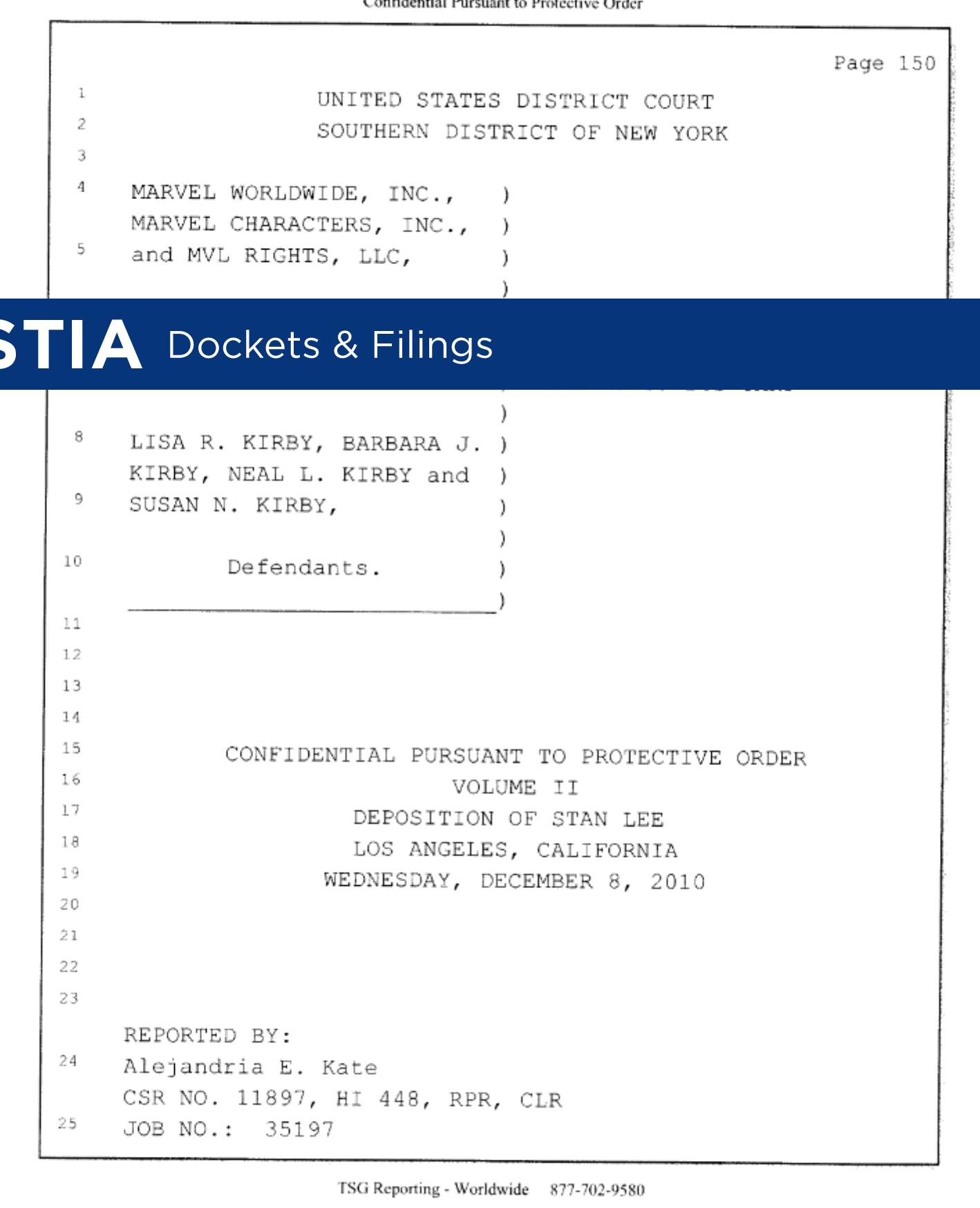
Patrick Ford Obviously Disney/Marvel had no objection to Lee whole deposition being made public. Lee's deposition testimony was according the the judge the basis of her ruling against the Kirby's The judge went so far as to say their case, "Stands or falls on his (Lee's) testimony" and the judge quoted extensively from it in her Summary Judgment against the Kirby's.
Patrick Ford
What certain people have done all along and continue to do is pretend that Toberoff's deposition does not exist. That in spite of the fact it was around twice as long as Marvel's deposition of Lee.
Toberoff asked no questions of Lee during the May 13 deposition. He reserved all his questions for the Dec. 8 deposition. Only tiny bits of that deposition have ever been made public.
Patrick Ford
Here is a link to the scraps of Toberoff's deposition which are public. It's actually fewer than 32 pages as there is a cover page and several other pages describing the participants before the deposition begins.
https://docs.justia.com/cases/federal/district-courts/new-york/nysdce/1:2010cv00141/356975/102/10.html
Although the deposition begins on page 150 the first page of testimony which hasn't been cut is page 194. Right away there are over 40 pages cut.
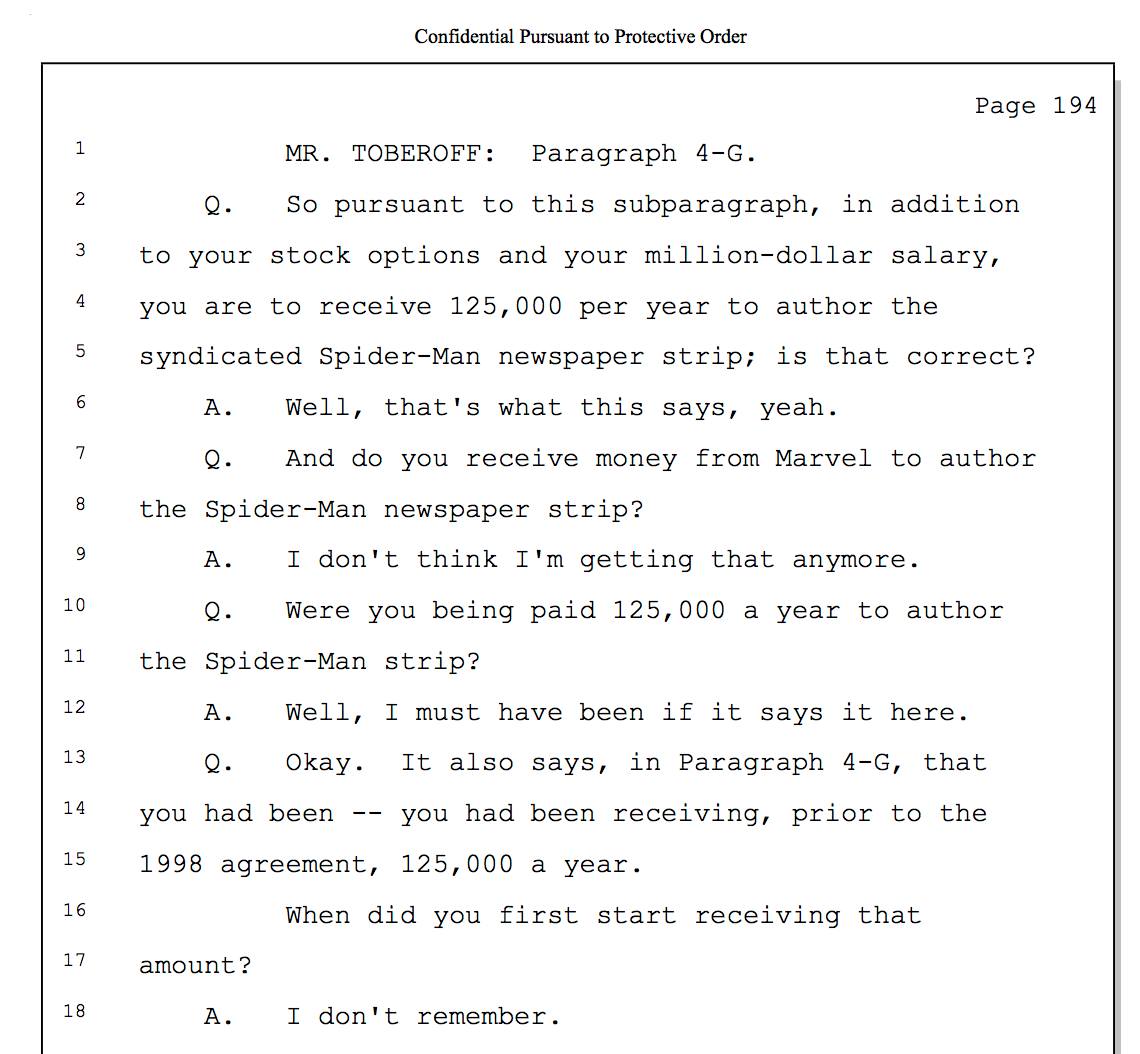
The next page we get to see is page 254. Another 60 pages missing.

Pages 254-257 are complete. So four pages. Then another jump to page 275. Close to another 20 missing pages.
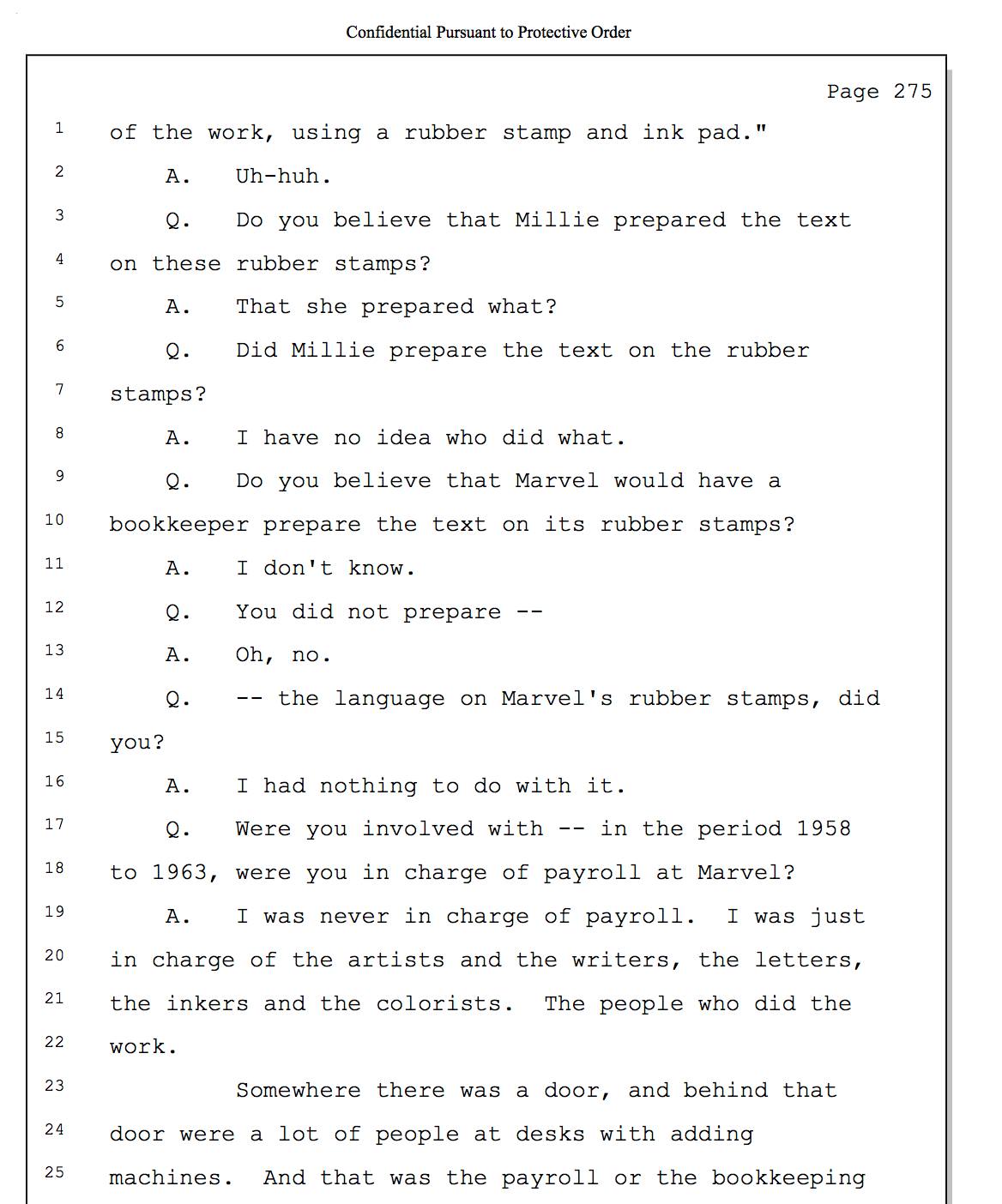
Pages 275 and 276 are present and then another jump to page 284.

Pages 284-287 are present and then another jump to page 316.

Pages 316 and 325 are present and then a jump to page 367.
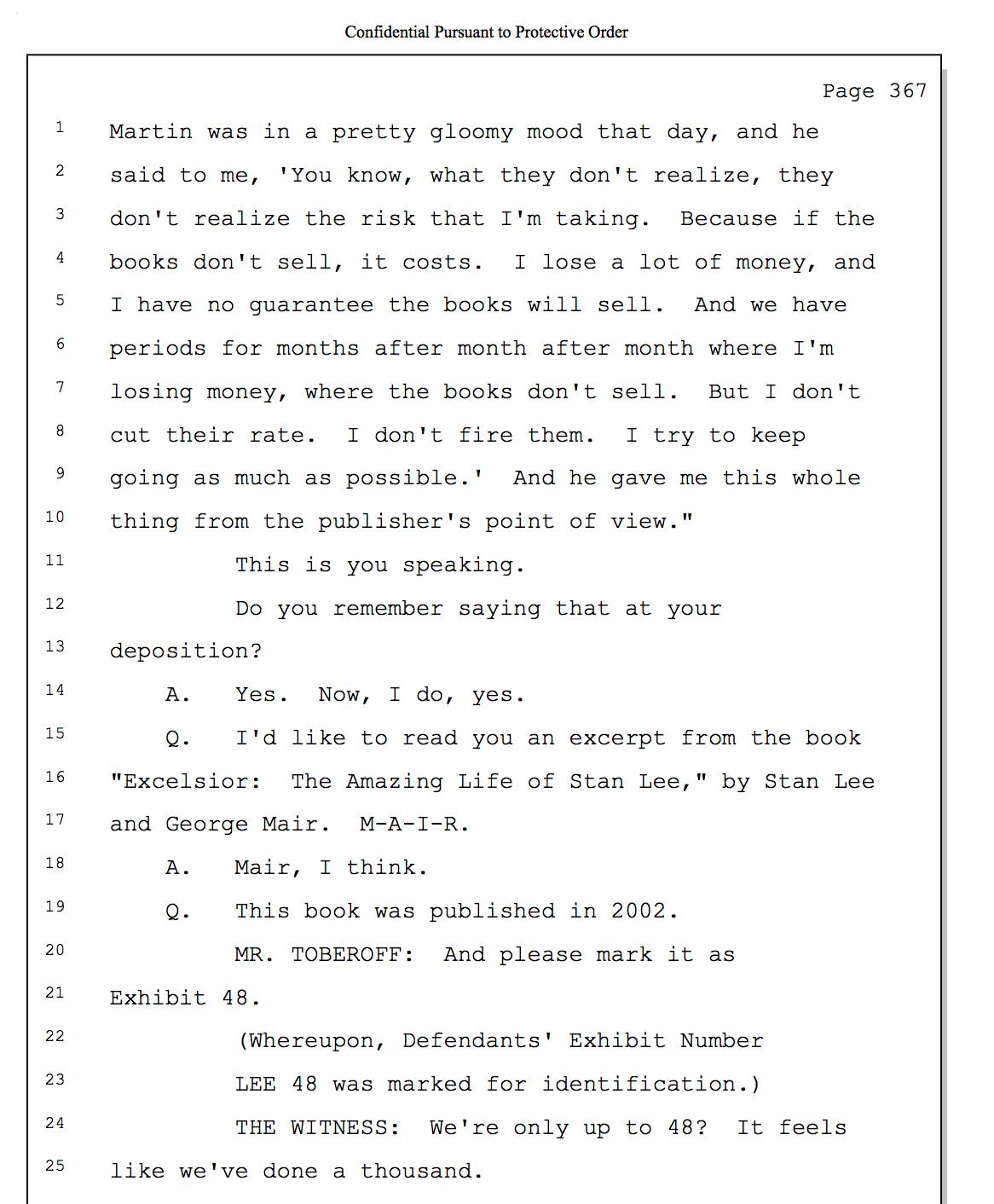
As anyone can see the vast majority of the pages are not public. Clearly Marvel objected to their publication. The document concludes on page 396.

The fact is Lee's entire May 13, 2010 deposition is public. Obviously no one cared. Toberoff may have felt it helped his case. Lee's deposition testimony was full of factual errors and contradictions.
So are we to assume that 100% of a deposition was clear and free of anything which might damage Disney or Marvel while at the same time well over 200 of Toberoff's Dec. 8, 2010 deposition had to be hidden from the public because to disclose them would have made public Marvel's business secrets ? Keeping in mind that it was Stan Lee talking not a person employed in any financial or legal aspect of Disney or Marvel ?
Further more all you have to do is look at the few pages which are public in order to see the sort of thing Lee was being asked about.
There is clear evidence in Lee's testimony as to what he was being asked about. He was being asked about the exhibits.
For example on page 367 Lee is asked to look at exhibit 48 and Lee remarks: "We're only up to 48 ? It feels like we have done a thousand."
Exhibit 48 happens to have been the George Mair book which Michael J. Vassallo was so critical of.
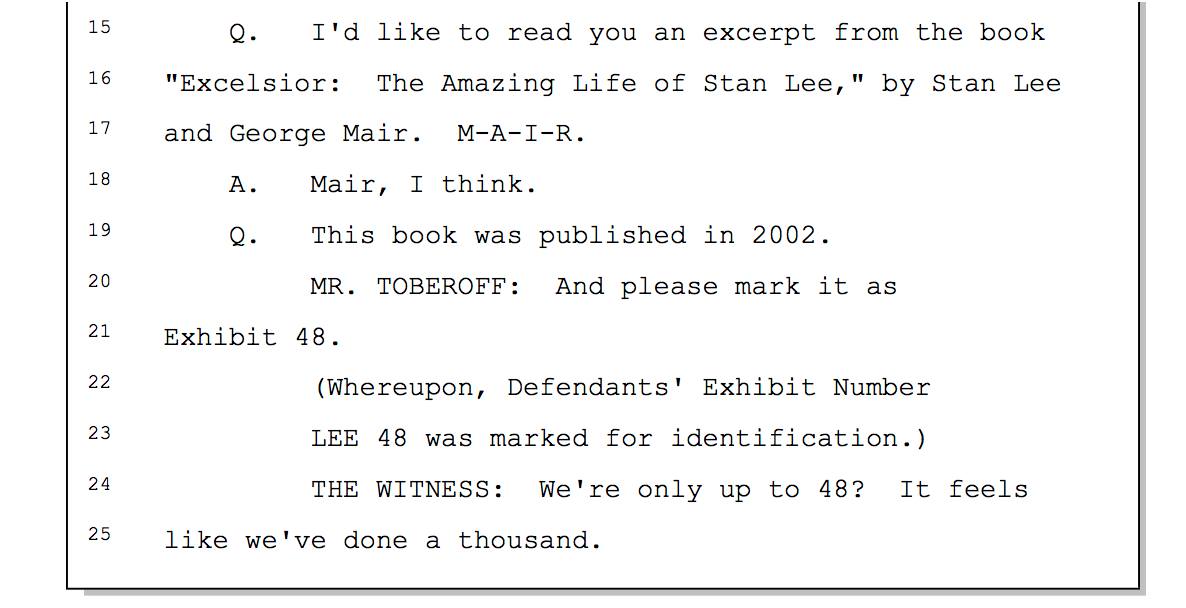
Michael J. Vassallo
Yeah, I'd hardly call that a "history" book.
[ed: Vassallo is the world's foremost authority on the topic]
Patrick Ford
If a person reads only the 28 pages which are public it should be obvious to anyone that Lee was not being asked about corporate secrets. He is being intensively question about contradictions and prior statements. As each subject comes up it was identified and marked with a number. Such as here:

And here:
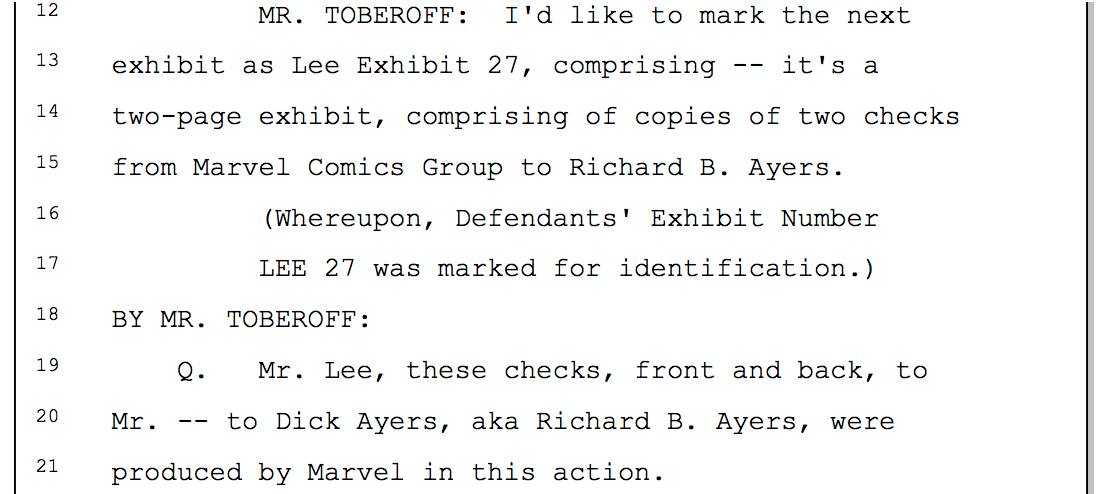
And here:

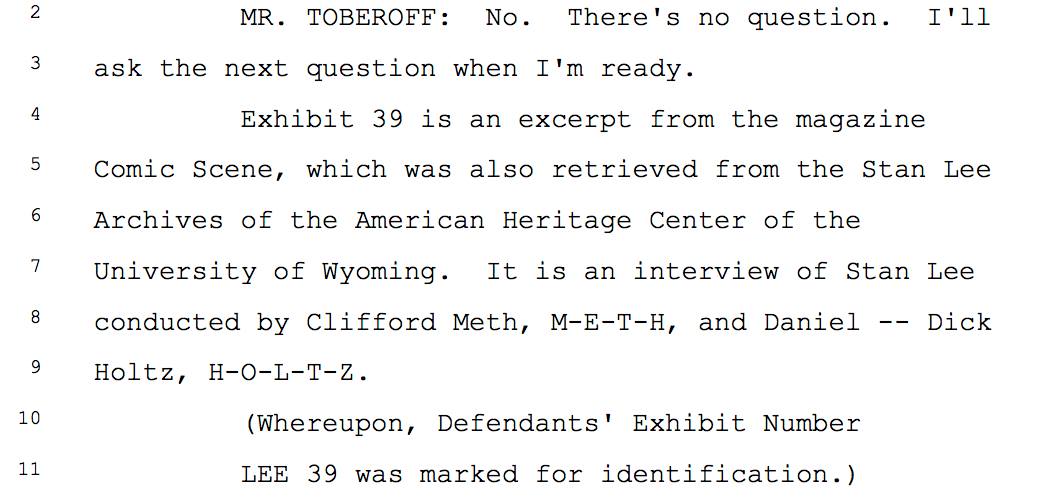
And here an interview where Lee can not recall if Ditko or Kirby designed Spider-Man's costume.
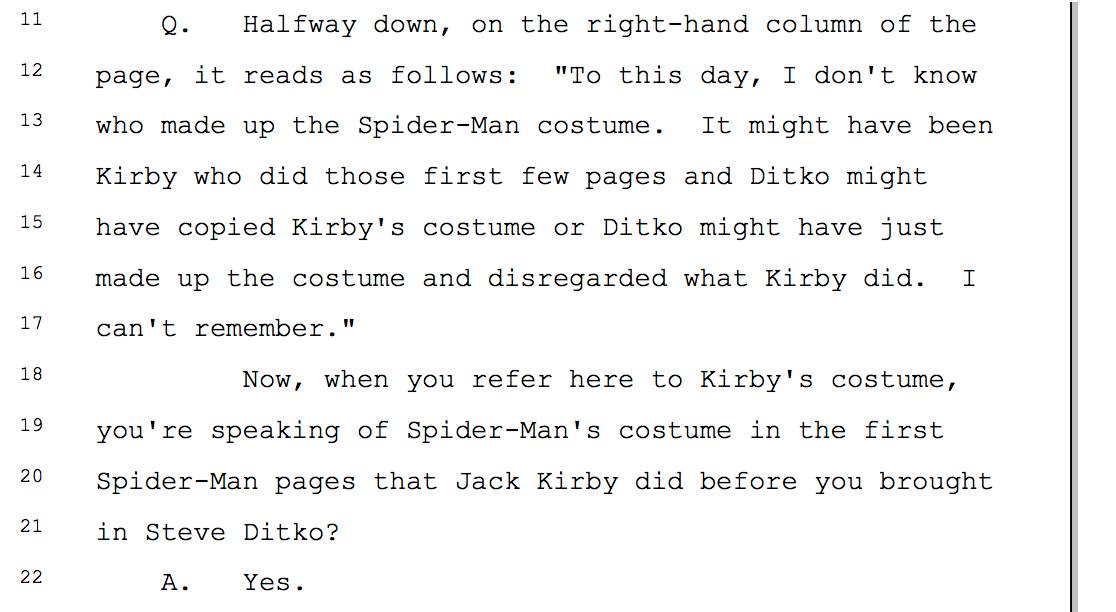
Lee recalls the 1949 period after which according to Lee only Marie Severin and John Romita remained on staff. Lee may be confusing 1949 and 1957 but even in that context Romita was not retained. And I don't think Marie Severin was employed by Marvel until 1956.
Michael J. Vassallo might know if there is something I'm missing.
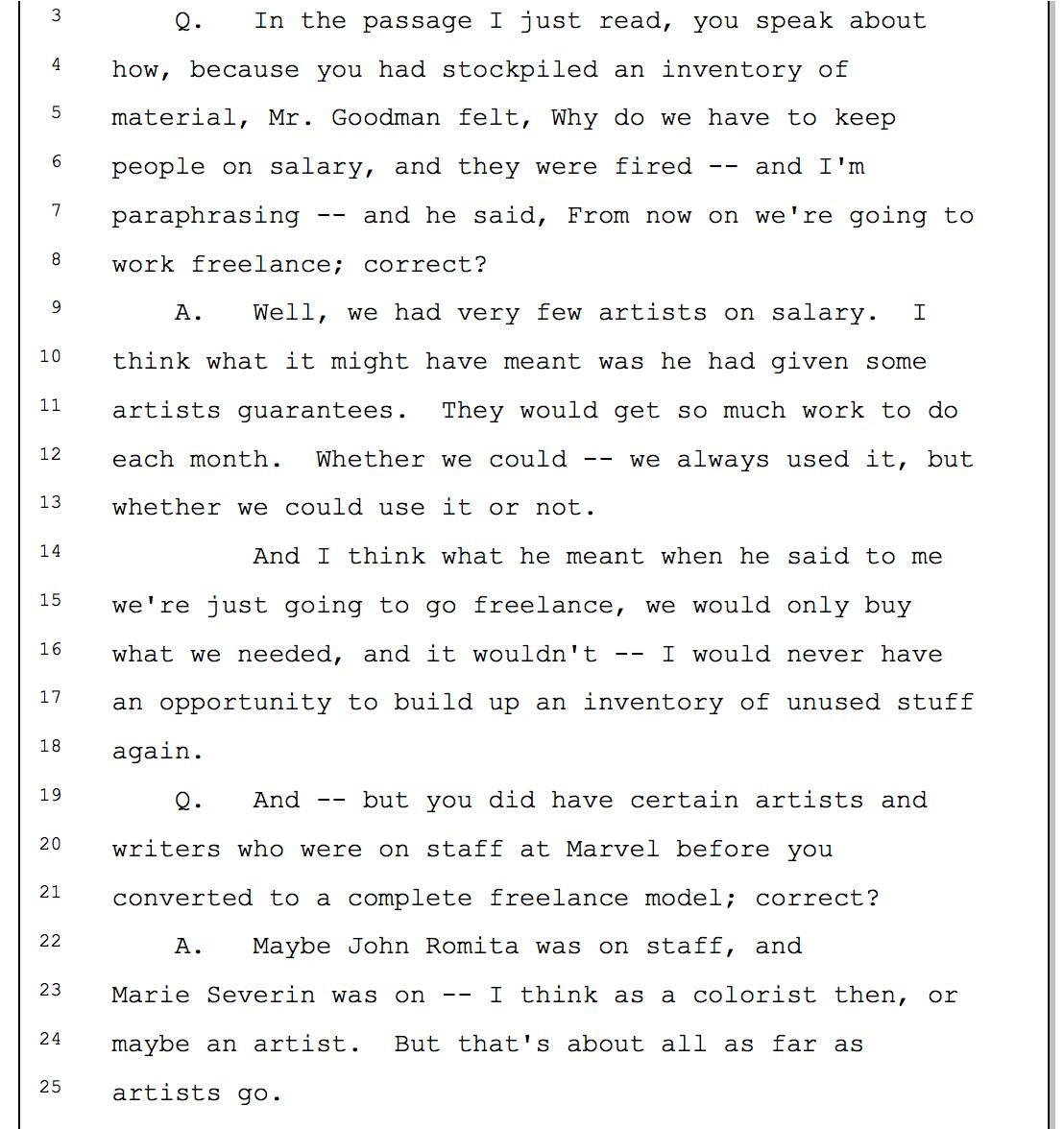
Michael J. Vassallo
Neither John Romita nor Marie Severin were anywhere near Marvel in 1949. In 1957 Romita lost all his freelance work but was never on staff. Marie Severin was on staff, of sorts, in 1956-7, leaving as Atlas imploded, not returning until 1965 or so. So Lee's recollection is completely skewered.
Patrick Ford
What about Romita as a ghost in 1949 ? Not that it really matters as to him being on staff.
Michael J. Vassallo
Absolutely not. He didn't appear until 1951 penciling for Les Zakarin
Patrick Ford
As Lee's recollections are so unreliable the judge might have considered that. Instead she wrote:

I'll never understand how the judge allowed the testimony of Thomas and Romita when neither of them were at Marvel during the 1958-1963 period in question.
One of the very first things Toberoff did when he questioned them was to get them to admit they knew absolutely nothing about what went oin during those years because they were not there.
BTW. Here is a link to the portions of Romita's deposition used by Toberoff. Or at least the public portions. There are questions and answers not found in the deposition excerpts used and published by Marvel.
https://docs.justia.com/cases/federal/district-courts/new-york/nysdce/1:2010cv00141/356975/102/6.html
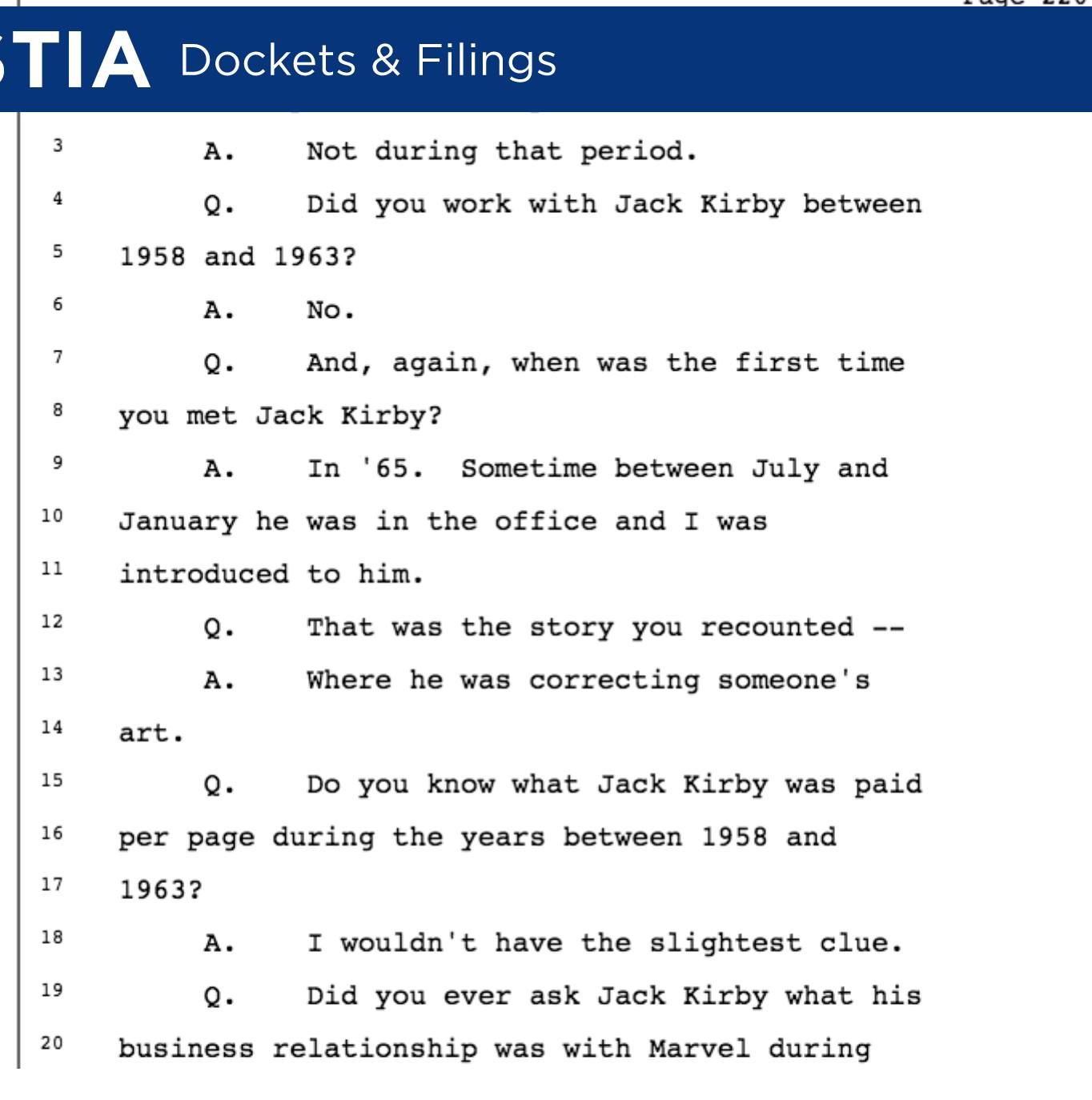
One more thing on this.
According to Marc Toberoff, the Kirby's attorney, his legal strategy from the start anticipated an eventual appeal to the Supreme Court of the United States. That does not mean Toberoff made no effort at the lower levels, it means he anticipated the lower court judges relying on prior case law which Toberoff felt was deeply flawed and ripe for review by SCOTUS.
This was not some unique insight on the part of Toberoff. It was near universally trumpeted with accompanying marching bands at the time that the Kirby's had no chance due to the merits of their case being a matter of "settled law" rather than moral or ethical principals.
There were virtually no dissenting voices to this chorus of corporate supplicants. Even those people who supported (or in most cases feigned support for) the Kirby's tried to butt into line to be first to claim the law was against the Kirby's.
Toberoff from the start played the long game. He was always aware that the only forum where the stakes were high enough to make Disney blink was the Supreme Court. At that level Disney simply could not afford to gamble on a ruling which would have swept over the whole entertainment industry like a tsunami leaving a completely changed landscape in it's wake.
At that point Disney decided to pay off the Kirby's rather than risk having to deal with a whole new world.
The odds were still with Disney, the stakes were too high.
Why didn't Kirby sue Marvel while he was alive?
29 Sep 2017:
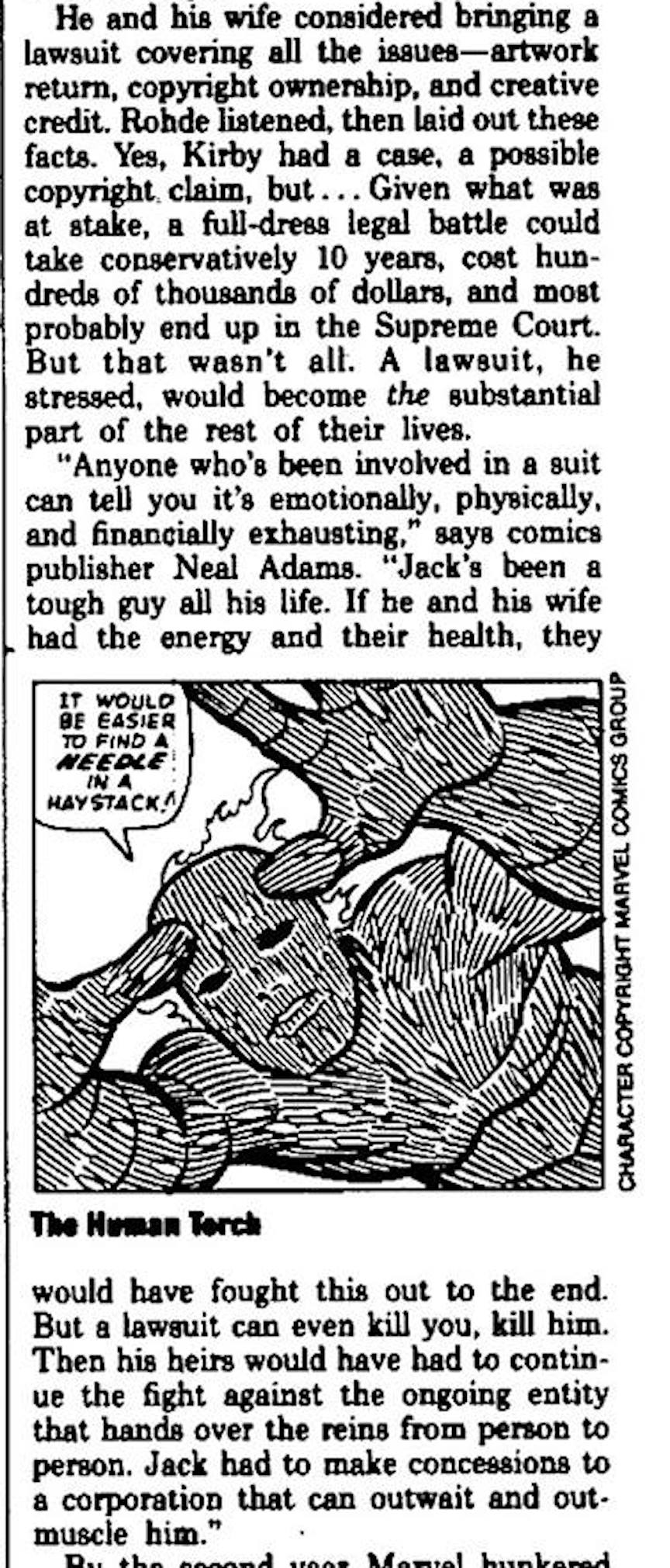
Patrick Ford
This is an excellent summary of Kirby's legal situation and strategy. You will often see poorly informed fans (and people who are or claim to be attorneys) accuse Kirby of not seeking legal representation, or wondering why he didn't sue. I doubt the following will have any affect on those people. Anyone looking at the situation with an open mind should easily understand this. It also goes a long way towards explaining why someone like Steve Ditko does not become embroiled in legal action against a large corporation.
As we have seen Stephen Rohde's prediction was accurate. Although it did not take ten years. It did end up in the Supreme Court or at least on the doorstep.
BTW. Stephen Rohde was not some small town attorney with a shack on the edge of an Indiana corn field. He was one of the most accomplished attorneys in Hollywood.
home


















